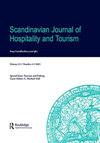“从多元活动到创业:瑞典近海商业渔业在服务型经济中的导航”
IF 3.1
4区 管理学
Q2 HOSPITALITY, LEISURE, SPORT & TOURISM
Scandinavian Journal of Hospitality and Tourism
Pub Date : 2021-04-01
DOI:10.1080/15022250.2021.1906744
引用次数: 6
摘要
摘要几十年来,瑞典近海商业渔业的渔民数量一直在下降。与此同时,服务经济变得越来越重要,旅游业的增长就是一个例子。这为活跃在传统农村产业中的小公司带来了新的条件。虽然对小型旅游公司的社会文化背景的了解还不充分,而且由于政策制定赋予这些公司在可持续农村发展中的关键作用,本文旨在探索21世纪头几十年发生变化的传统行业。这项定性研究基于一项受多地点民族志启发的实地调查,该调查是在瑞典西海岸为2019年发表的一篇论文进行的。根据话语理论和定位概念,分析得出结论,服务经济中的近海渔业有望成为可持续的企业家和社区的东道主。渔民们以一种矛盾的方式定位自己,既抵制又顺应政治管理话语。当代服务型经济和社会关系在很大程度上形成了这些小公司,其特点是高度依赖当局,并与港口游客相遇。本文章由计算机程序翻译,如有差异,请以英文原文为准。
“From pluri-activity to entrepreneurship: Swedish inshore commercial fisheries navigating in the service-oriented economy”
ABSTRACT For decades, inshore commercial fisheries of Sweden have declined in the number of fishermen. In parallel, the service economy has gained importance and the growth in tourism is one example. This implicates new conditions for small firms, active in traditional rural industries. While knowledge about the socio-cultural context of small tourism firms is underdeveloped and since policymaking assigns these firms a key role in sustainable rural development, this article aims to explore a traditional industry in change during the first decades of the twenty-first century. This qualitative study is based on a fieldwork inspired by multi-sited ethnography, conducted at the Swedish west coast for a dissertation published in 2019. Drawing on discourse theory and the concept of positioning, the analysis concludes that inshore fisheries in the service economy are expected to become sustainable entrepreneurs and hosts for their communities. The fishermen position themselves in a contradictory manner both resisting and conforming to the political management discourse. The contemporary service-oriented economy and social relations largely form these small firms, which are characterised by both a high dependency on authorities and by their encounters with harbour visitors.
求助全文
通过发布文献求助,成功后即可免费获取论文全文。
去求助
来源期刊
CiteScore
7.90
自引率
8.30%
发文量
14
期刊介绍:
Scandinavian Journal of Hospitality and Tourism is the leading Nordic journal for hospitality and tourism research. SJHT aims at initiating and stimulating high-impact and innovative research relevant for academics and practitioners within the hospitality and tourism industries. The journal takes an interdisciplinary approach including, but not limited to geography, psychology, sociology, history, anthropology, and economics. SJHT encourages research based on a variety of methods, including both qualitative and quantitative approaches. The journal covers all types of articles relevant to the Nordic region, as well as the North Atlantic, North Sea and Baltic regions. We also welcome reviews and conceptual articles with a broader geographical scope that clearly enhance the theoretical development of the hospitality and tourism field. In addition to research articles, we welcome research notes and book reviews. Published articles are the result of anonymous reviews by at least two referees chosen by the editors for their specialist knowledge.

 求助内容:
求助内容: 应助结果提醒方式:
应助结果提醒方式:


